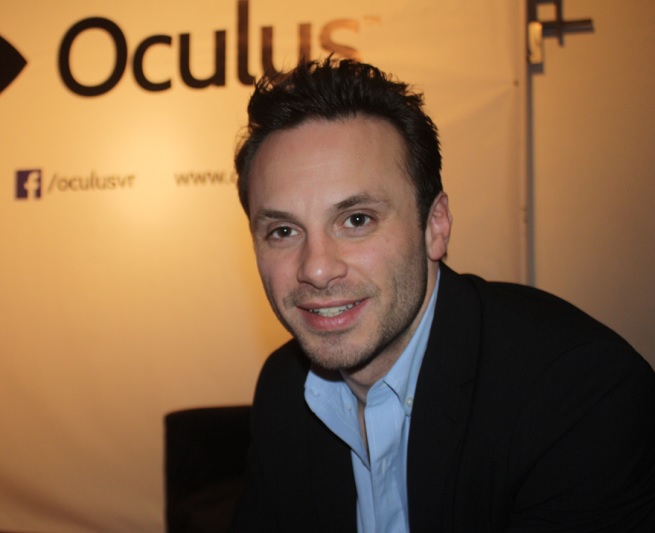As Oculus VR CEO Brendan Iribe weighed the decision to sell his hot virtual reality startup to Facebook, he asked himself, “Do we want to be [like the] Game Boy? Or do we want to be Android?”
Facebook bought Oculus VR for $2 billion in March, giving the young virtual reality headset company a home on a home that more than one billion people use every month. In the end, Iribe chose to be more like Android, which is now on more than a billion devices.
Discussing the acquisition at the TechCrunch Disrupt conference in New York City today, Iribe sounded surprisingly pragmatic: “Do we want to be a platform with one billion users, or one with 10, or 20, or 50 million?”
Oculus’s technology centers on bulky headsets that you hook up to PCs to power virtual reality experiences. Taken literally, Iribe’s comparison between the Game Boy and Android seems confusing — one is a portable gaming console, while the other is a mobile operating system. Oculus also announced last year that it would support Android in an upcoming developer kit.
But looking at it a bit more broadly, Iribe was making it clear that he didn’t want Oculus to be limited to an audience of just a few hundred million, like every typical gaming console or gaming PCs. (Let’s just ignore the fact that Android support opens up Oculus to a huge audience as well.)
For example, even though it was a hit among consumers, the Game Boy (and its variants before the release of the Game Boy Advance) only ended up selling around 120 million devices. Iribe seems to envision a world where potential Oculus customers can reach over a billion (by which point it likely won’t be connected to a powerful gaming PC).
Facebook isn’t a hardware company, but as Iribe describes it, he sees joining the social network as an opportunity to be more successful than any console has been in the past. Of course, Oculus won’t sell a billion headsets overnight, but Facebook’s backing could enable it to sell its VR headsets for far less the $350 cost of its current developer kits.
“This is going to be the most social platform of all time,” Iribe said, echoing a sentiment shared by Oculus CTO John Carmack (the id Software cofounder, a creator of the Quake and Doom series, and all-around gaming god).
Oculus unveiled its second headset targeted at developers in March, but Iribe alluded to an even more powerful device that Facebook cofounder Mark Zuckerberg tested before he offered to buy the company. Iribe wouldn’t offer many details, but it sounds as if that demo alone sold Zuckerberg on the viability of Oculus’s technology.
Iribe announced today that Oculus has also created a research group, which will help to spread virtual reality to students and schools.
“We are replacing vision and making synthetic vision,” Iribe said. “This is going to be what we call ‘the final platform.’ You can convince and trick your brain to be in this place.”
VentureBeat's mission is to be a digital town square for technical decision-makers to gain knowledge about transformative enterprise technology and transact. Learn More

